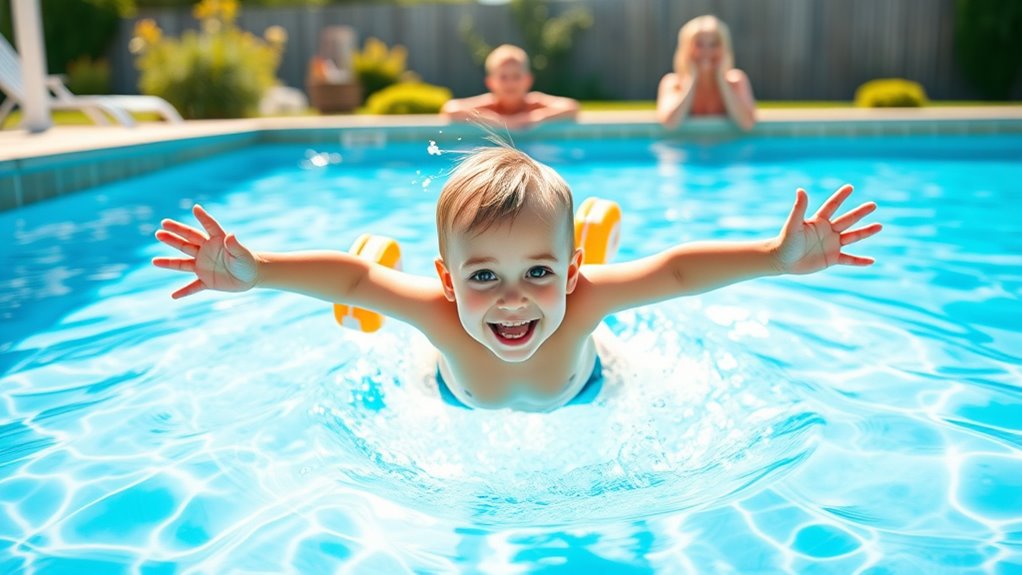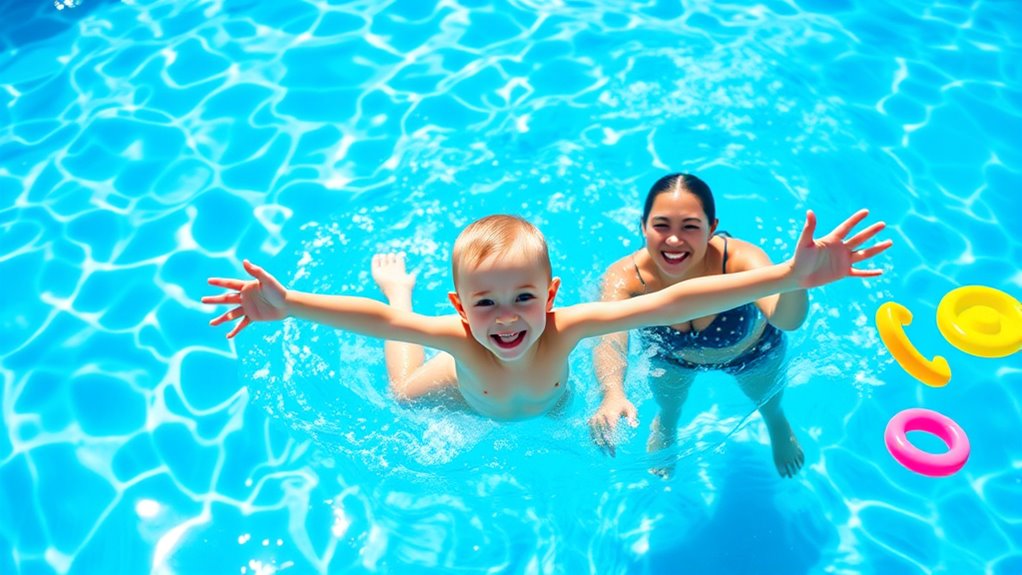To teach your kids to love the water, make swimming fun by introducing colorful floats, waterproof toys, and playful songs. Make certain they wear well-fitting safety gear like life jackets to build confidence. Enroll them in gentle, enjoyable lessons that focus on safety and exploration. Practice basic skills through games and short sessions, always celebrating their milestones. Keeping a positive, encouraging environment helps foster a lifelong love for water—keep going to discover even more tips and tricks.
Key Takeaways
- Introduce water through playful activities, colorful floats, and waterproof toys to foster curiosity and positive associations.
- Ensure children wear properly fitted safety gear, like life jackets, to build confidence and promote safe exploration.
- Enroll kids in fun, gradual swimming lessons that emphasize patience, encouragement, and enjoyment.
- Practice basic water skills regularly with games and songs to keep children engaged and confident.
- Create a supportive, pressure-free environment that celebrates milestones and nurtures a lifelong love for water.

Getting your kids comfortable and confident in the water can be a rewarding experience, and it all starts with making swimming fun. When you introduce them to water in an engaging way, they’re more likely to develop a positive attitude and a sense of curiosity. One of the best ways to do this is by ensuring they have the right safety gear, like well-fitting life jackets or buoyancy aids, especially when they’re just starting out. These items provide a sense of security and help prevent accidents, allowing your kids to focus on enjoying their time in the pool or at the beach. Remember, safety gear isn’t just about protection; it’s about giving your children confidence to explore the water without fear. Alongside safety gear, enrolling your kids in swimming lessons can accelerate their comfort level and teach them essential water safety skills. Look for classes that emphasize patience, fun, and gradual skill-building, so your kids don’t feel overwhelmed. Skilled instructors understand how to create a positive environment where children can learn at their own pace, helping them see swimming as an exciting activity rather than a chore.
As your children begin their lessons, encourage them to practice basic water skills regularly. Simple exercises like blowing bubbles, kicking their legs, and floating on their back build foundational confidence. Make each session playful—use colorful floats, waterproof toys, or singing songs to keep their attention engaged. The more enjoyable the experience, the more enthusiastic they’ll be to try new things in the water. Consistency is key; frequent, short practice sessions are more effective than infrequent, lengthy ones. Praise their efforts, no matter how small, to reinforce a positive attitude toward swimming. Over time, as they gain more experience, they’ll naturally develop a love for the water.
Your role is to be supportive and patient, always prioritizing safety and fun over speed. Keep the atmosphere light and encouraging, celebrating every milestone, from dipping their toes in to swimming across the pool. Remember that every child progresses at their own pace, and the goal is to foster a lifelong love of water while ensuring they understand the importance of safety. By combining the right safety gear, engaging lessons, and a positive environment, you’re helping your kids not only learn to swim but also develop confidence and a genuine affection for the water that can last a lifetime.
Frequently Asked Questions
How Can I Motivate Reluctant Children to Try Swimming?
To motivate reluctant children to try swimming, start by making water play fun and non-intimidating. Use swimming games that capture their interest and encourage movement in the water without pressure. Celebrate small successes and offer plenty of positive reinforcement. Keep sessions short and enjoyable, gradually building their confidence. When kids associate water activities with fun, they’re more likely to develop a love for swimming and become enthusiastic to learn more.
What Safety Gear Is Essential for Young Beginners?
Oh, because who doesn’t love swimming without safety gear? You definitely want your young beginners to wear life jackets, especially in deep water, and goggles to protect their eyes and help them see clearly. These essentials not only keep them safe but also boost confidence. Remember, a little safety goes a long way in making water fun and worry-free for your kids.
How Do I Handle Fears or Anxieties About Water?
When your child feels scared or anxious about water, your goal is water confidence and fear reduction. You can start by talking gently about their feelings and reassuring them it’s okay to be nervous. Use gradual steps, like splashing or floating, to build trust. Keep sessions short and positive, celebrating small victories to help them feel safe and comfortable, which naturally reduces fear and boosts their confidence in the water.
When Is the Right Age to Start Swimming Lessons?
You might worry about your child being too young for swimming lessons, but early introduction boosts water safety and helps reach important swimming milestones. Experts recommend starting around age 1 to 4, when kids are developmentally ready to learn basic skills and build confidence. Starting early doesn’t mean diving in headfirst—it’s about gentle, fun experiences that set a solid foundation for safe water enjoyment and skill development.
How Can Parents Model Positive Water Attitudes?
To model positive water attitudes, you should demonstrate good water safety habits and enjoy water activities yourself. Show enthusiasm and confidence, which encourages your child to feel comfortable and safe around water. Engage in parent-child bonding during swimming, making it fun and stress-free. Your positive attitude helps your child develop a healthy relationship with water, fostering trust and confidence that will benefit them now and in future water activities.
Conclusion
Getting your kids comfortable in the water sets them up for a lifetime of fun and safety. Remember, children who learn to love swimming are 14 times more likely to develop strong water safety skills. Keep things playful and patient, and celebrate their progress. With your support, they’ll not only enjoy the water but also build confidence and important life skills. Immerse yourself with enthusiasm—your encouragement makes all the difference!










